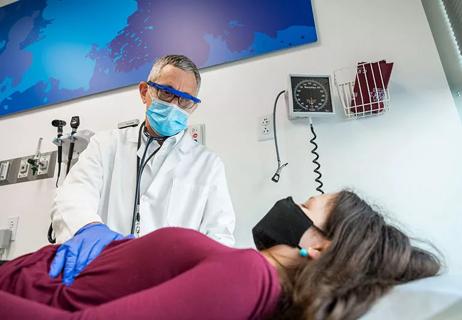The best way to figure out which kind you need is to first speak with your primary care provider

There are seemingly endless types of doctors, and if you don’t work in the medical field, it can be a little difficult to determine what they do and which type you need to see. Add in all of the hard-to-understand medical terminology, and it’s no surprise if you’re feeling overwhelmed and even a little lost.
Advertisement
Cleveland Clinic is a non-profit academic medical center. Advertising on our site helps support our mission. We do not endorse non-Cleveland Clinic products or services. Policy
But you don’t have to try to figure it out alone. Family medicine specialist Neha Vyas, MD, explains some of the most common types of doctors and what they do, including the kinds of conditions they treat.
First things first: A primary care provider (PCP) is your go-to, your first point of contact. They’re the one you see for annual check-ups and vaccines, the one you call when you have the flu and the one you talk to about medical concerns as they arise.
“Your PCP is responsible for a range of services, including checkups, immunizations, health screenings and managing chronic conditions,” Dr. Vyas says. “They also play an important role in preventive care and focusing on your long-term health.”
PCPs are there to:
A primary care team may include these types of providers:
Advertisement
“Your primary care provider works closely with anyone else involved in your care, and their office keeps records of your health throughout the years,” Dr. Vyas says, “so it’s important to find a PCP and cultivate a lasting relationship.”
Whether you have hay fever, a bout of hives or a life-threatening food allergy, allergists and immunologists are the doctors for the job.
Allergies happen when your body’s immune system overreacts to something it sees as an invader (say, pollen, pet dander, shellfish or peanut butter). These doctors specialize in conditions related to allergies and your immune system.
“They might use skin prick tests, blood tests or other tests to figure out what you’re allergic to,” Dr. Vyas explains. “From there, treatment depends on the severity and type of your allergy, like whether you have seasonal allergies, food allergies and so on.”
If you’ve been diagnosed with an allergy, you may see an allergist or immunologist for allergy shots. They can also prescribe medications, inhalers and other breathing treatments to help you manage your asthma, especially if it’s triggered by allergies.
Anesthesia is a treatment that prevents you from feeling pain during medical procedures — and anesthesiologists are the doctors who administer it. They also monitor your health during your procedure and help manage your pain afterward.
“There are different types of anesthesia,” Dr. Vyas notes. “Sometimes, anesthesia just numbs one area of your body, and other times, it’s administered to make you unconscious throughout a procedure.”
The type of anesthesia you need depends on the procedure you’re having and other factors, like your risk of complications. Anesthesiologists are trained to understand those complexities to make sure you’re receiving the best care possible.
It’s always important to follow your heart — especially if it’s leading you to a cardiologist. These doctors specialize in conditions related to your heart and cardiovascular system, from minor abnormalities to life-threatening illnesses, including:
Cardiologists perform various tests, including chest X-rays, cardiac CTs and MRIs, cardiac catheterizations, electrocardiograms and echocardiograms, to make their diagnoses. They can also prescribe medications and perform corrective procedures.
“Some also focus on preventive cardiology, helping you stay healthy so you don’t experience a cardiac event,” Dr. Vyas says. “They’ll assess your risk of cardiovascular disease and teach you to manage any existing conditions so they don’t worsen.”
Advertisement
When you think of dermatology, you may think primarily of pimples, but dermatologists handle all that and then some. (And no, their job doesn’t always look like what you’ve seen on Dr. Pimple Popper!)
Dermatologists specialize in conditions related to the skin, hair, and nails, including:
“If you’re diagnosed with skin cancer, dermatologists can provide treatments like excision and radiation,” Dr. Vyas says.
And not all dermatologists have the same focus. Medical dermatologists focus on skin health, like the above conditions, while cosmetic dermatologists do procedures like Botox® injections, laser surgery, fillers and chemical peels.
No one wants to have to visit the emergency room, but if you do, you’ll be in the presence of skilled emergency medicine specialists who specialize in treating life-threatening medical conditions. They’re trained in:
Advertisement
“Your endocrine system creates hormones that regulate nearly all of your bodily functions, including growth and development, metabolism, sexual function, reproduction and more,” Dr. Vyas explains.
Endocrinologists, then, are doctors who specialize in hormonal (endocrine) disorders. They use blood tests, imaging and other methods to identify, treat and monitor conditions like:
Hormones are related to so many bodily functions that endocrinologists work closely with other providers to make sure you’re getting comprehensive care.
Looking for a primary care provider who can see everyone in your family, no matter their age? That’s the role of family medicine specialists, who care for everyone, from newborns to seniors.
They focus on treating common and complex diseases, in addition to promoting preventive health and wellness. “Family medicine specialists can treat your family throughout the lifecycle,” Dr. Vyas states. “They often see the same patients for years or even decades.”
Advertisement
To better understand what family medicine doctors do, head back to the start of this list and read the opening section on primary care providers.
When tummy troubles escalate to something more, it may be time to involve a gastroenterologist, sometimes called a gastrologist. “They specialize in conditions related to the esophagus, stomach, small bowel and colon,” Dr. Vyas says, “along with diseases of the pancreas, liver and gallbladder.”
Gastroenterologists diagnose and treat disorders like:
Gastroenterologists use diagnostic tools and procedures like endoscopies, colonoscopies and more. They also work closely with other healthcare providers like dietitians, surgeons and oncologists.
As you age, your body starts to change in all kinds of ways, and your medical needs may become multifaceted. Geriatricians are aging specialists, focused on how the passage of time affects your mind and body and what you need in order to stay healthy.
“Geriatricians are doctors of internal or family medicine who have additional training in geriatrics, or the health and care of older adults,” explains Dr. Vyas. “They specialize in preventing, diagnosing and caring for health issues that develop as you age.”
That includes:
A geriatrician doesn’t replace a primary care provider, but works closely with them and with any other specialists you see, especially if you have multiple health issues or complex conditions.
To be any kind of healthcare provider, you have to get comfortable with the possibility of blood and bleeding. But that’s especially true for hematologists.
“As blood disorder specialists, hematologists specialize in diagnosing, treating and managing conditions related to the blood, bone marrow and lymphatic system,” Dr. Vyas states. For example, they address:
Hematologists work closely with pathologists, oncologists, surgeons and others.
Be careful with the spelling of this one. The word “hepatologist” looks and sounds a lot like “herpetologist” — scientists who study reptiles and amphibians! But hepatology is a branch of gastroenterology concentrated on liver disease and conditions that affect your gallbladder, pancreas and biliary tract.
“Some physicians specialize in gastroenterology on the whole, while others have a narrower focus on just hepatology,” Dr. Vyas notes. You might see a hepatologist for:
Hepatologists manage aspects related to liver transplants, and they help you manage your disease through medication, lifestyle changes and more.
Wait, why aren’t these doctors -ologists of some sort?! The technical term is “infectiologist,” but it’s rarely used — so “infectious disease specialists” it is.
“Typically, your primary care provider can treat you for common infectious diseases, like if you have a mild case of the flu, strep throat or COVID-19,” Dr. Vyas says. “But if you’ve been hospitalized for a severe infectious illness, or if things escalate to become severe, infectious disease specialists may get involved.”
You might see an infectious disease specialist for:
You might also see an infectious disease specialist for a pre-travel consultation, for serious illness after you’ve traveled or for a fever of unknown origin.
Don’t be fooled by this word: Internists aren’t interns! These primary care providers are skilled, fully trained and licensed doctors who specialize in internal medicine, hence the term “internist.”
“Specialists focus on one part of the body, like your heart or your bones,” Dr. Vyas clarifies, “but internists are trained as generalists, focusing on both preventing and treating diseases that affect adults.”
For more information about what internists do, scroll back up to the top of this list and check out the first section on primary care providers.
If you’re dealing with kidney issues, nephrologists are the specialists who can help. These doctors specialize in kidney-related conditions like:
Nephrologists also manage dialysis and kidney transplant care, though they don’t do surgery. “They provide ongoing care to help patients maintain their kidney function and manage their symptoms,” Dr. Vyas says, “and they work with other providers, like urologists, oncologists and dietitians, as needed.”
Your nervous system is your body’s command center, controlling everything you think, feel and do, so when something is off in your nervous system, it can impact your whole body.
Neurologists specialize in conditions that affect your brain, spinal cord and nerves, like:
“Brain conditions can impact your entire body, so your neurologist works closely with other healthcare providers,” Dr. Vyas explains. “Depending on your condition, this may include surgeons, oncologists, speech therapists, physical therapists and more.”
Ever heard someone mention their Ob/Gyn or maybe just their OB? An OB is an obstetrician who focuses on all things related to pregnancy and childbirth. A gynecologist specializes in the overall health of women.
“Though these fields are different, they’re often lumped together into the umbrella category of ‘Ob/Gyn,’” Dr. Vyas notes. Gynecologists provide routine and preventive care, including:
But not everyone who sees a gynecologist will need an obstetrician — only if you’re pregnant or trying to become pregnant. Obstetricians specialize in:
When you’re coping with a cancer diagnosis, you want to be assured that your health is in the hands of someone who knows how to help. Oncologists specialize not only in diagnosing cancer, but also in working with their patients to develop a personalized treatment plan and provide supportive care.
There are three primary types of oncologists:
Oncologists may have specialties, like gynecology, pediatrics or neurology, that narrow their focus. And given the many complexities of cancer, these doctors work closely with surgeons, radiologists, pathologists and others so they can provide you with comprehensive, compassionate cancer care.
“This also means helping patients manage the symptoms of cancer and the side effects of treatment, like pain, nausea and fatigue,” Dr. Vyas adds, “in addition to physical and emotional challenges.”
I spy with my little eye … ophthalmologists, also known as eye doctors, who specialize in diseases and disorders related to the eyes. You might go to the ophthalmologist for:
Not clear on the difference between ophthalmologists and optometrists? Ophthalmologists are medical doctors, while optometrists have a doctor of optometry (OD) degree and attend optometry school instead of medical school.
“You may see an optometrist for your routine eye exams or for minor eye-related conditions like pink eye,” Dr. Vyas says, “but they’ll likely refer you to an ophthalmologist for more severe eye problems.”
If sticks and stones break your bones, an orthopedist may be involved in helping you heal. These specialists diagnose, treat and manage conditions related to your musculoskeletal system, which includes bones, joints, ligaments, tendons, muscles and nerves. That includes health issues like:
Orthopedists can also perform joint replacement surgery (think hip or knee replacement) to treat joint damage caused by injuries and conditions like osteoarthrosis.
“They work with other healthcare providers, including rheumatologists, physical therapists and occupational therapists, to develop specialized treatment plans to help patients recover from or manage their conditions,” Dr. Vyas says.
You may know otolaryngologists by their more common name — ear, nose and throat specialists, or ENTs. That also gives you a sense of their areas of specialty.
“Otolaryngologists treat a variety of diseases and disorders that affect the ear, nose and throat and related structures of the head and neck,” Dr. Vyas says. It’s a long list that includes:
Is there anything you’re surprised to see on this list? Many of these conditions are also within the purview of other types of healthcare providers, like neurologists, audiologists, speech therapists and oncologists. Otolaryngologists work closely with them to provide you with comprehensive care.
You don’t usually speak directly to pathologists, but they play a critical role in disease diagnosis and management behind the scenes.
“When you have a blood test, tissue sample or other type of testing done, pathologists are the ones reading those results and using them to help diagnose and treat medical conditions,” Dr. Vyas says.
Pathologists, who often work in lab settings, don’t typically directly interact with patients, but they work very closely with radiologists, oncologists, hematologists, surgeons and others to make diagnoses and determine treatments.
Pediatrics is the study of children’s health, and pediatricians are doctors who focus on treating kids. “They specialize in caring for children from birth to young adulthood,” Dr. Vyas notes. “That includes infants, children, and teenagers — typically up to age 18.”
Here are some things pediatricians do:
Pediatricians also work closely with other healthcare providers to provide comprehensive care to kids with complex medical needs and chronic illnesses. Pediatricians can specialize in a specific type of medicine to treat children with complex conditions, such as pediatric cardiology and pediatric endocrinology.
Even if you’re not familiar with the term “physiatrist,” you’re probably familiar with some of the things they do. They’re also known as physical medicine and rehabilitation physicians, or PM&R doctors.
“Physiatrists help you manage the pain related to neurological and musculoskeletal conditions, whether they stem from an injury or another condition,” Dr. Vyas says. “In most cases, you don’t work with just a physiatrist, but they consult with others, like primary care providers and neurologists, to restore your functionality.”
You might see a physiatrist for:
Physiatrists, who are medical doctors, are different from physical therapists, who have a doctorate in physical therapy but aren’t medical doctors. Physiatrists can diagnose health conditions, prescribe medicine and perform procedures, which physical therapists can’t do — but your physiatrist may prescribe physical therapy as part of your treatment plan.
There are 26 bones, 33 joints and more than 100 muscles, tendons and ligaments in your foot and ankle, so when something goes wrong, you’re going to want to see someone who knows exactly what’s going on in there.
Podiatrists are foot and ankle doctors who specialize in conditions like:
“Podiatrists often work with surgeons, wound care specialists and rehabilitation specialists to make sure you receive comprehensive care and that you heal well,” Dr. Vyas adds.
“Psyche” means mind or soul, which is what psychiatrists help treat and heal. These medical doctors are licensed to diagnose and treat mental health conditions through therapy and prescription medications.
You might see a psychiatrist for:
“Psychiatrists aren’t the same as psychologists, though the two often work hand-in-hand with one another and with other healthcare professionals to provide comprehensive assessments and compassionate treatment,” Dr. Vyas notes.
Psychologists are clinical specialists who have a PhD, not a medical degree. They can’t prescribe medication, but they can provide diagnostic and testing services, along with various types of psychotherapy.
Breathing is one of those things you may take for granted. You don’t think about your breath until you can’t catch it! Pulmonologists specialize in lung conditions and others that affect your respiratory system, like:
“Pulmonologists use diagnostic tests like chest X-rays, breath tests, sleep studies and more to make their diagnoses and figure out the right course of treatment,” Dr. Vyas says. “Like all specialists, they work closely with other healthcare providers to ensure that you’re getting the whole-body care you need.”
Nope, no radios here. Radiology involves imaging tests like X-rays, ultrasounds and MRIs — and radiologists are the doctors who specialize in these tests, including performing them and reading their results.
“Diagnostic radiologists are the experts who interpret your imaging results, while interventional radiologists use imaging techniques to help guide medical procedures,” Dr. Vyas clarifies. “A third type of radiologists, called radiation oncologists, specialize in using radiation therapy as cancer treatment.”
Rheumatologists are commonly associated with treating arthritis, but they specialize in other conditions, too.
“These physicians diagnose and treat autoinflammatory and autoimmune conditions that affect the bones, muscles, joints and skin,” Dr. Vyas says. These conditions can sometimes impact other body systems and organs as well.
Conditions that rheumatologists treat include:
Rheumatologists work with other specialists to diagnose you and create an individualized treatment plan.
No sleeping on the job, unless it’s your specialty — as it is for this category of doctors, who diagnose and treat disorders like:
Sleep medicine specialists, or somnologists, may have a variety of backgrounds and specialties, like pediatrics, internal medicine, family medicine, neurology and others.
“They often recommend a sleep study so they can make a diagnosis and figure out a course of treatment that will help you get good, high-quality sleep,” Dr. Vyas says.
Urologists specialize in conditions related to the urinary tract and the male reproductive system — but you don’t have to be man to see a urologist. After all, everyone has a urinary tract! You might see a urologist for:
Trying not to have any (or any more) kids? Urologists also perform vasectomies, a safe and effective form of male birth control that stops sperm from leaving your body.
This is a giant category all its own, as various types of surgeons specialize in different parts of the body and different types of surgeries and procedures. Some of the other types of doctors mentioned throughout this list are also surgeons (for example, gynecologists and urologists), while other types of surgeons just do surgery.
If you think you may need a specialist but aren’t sure where to begin, start by asking a primary care provider (PCP) — or if you’re trying to figure out something related to your child’s health, start with their pediatrician.
The exception is in the case of emergencies, when you should go directly to the emergency department. And even then, you should still follow up with your primary care provider afterward.
“Your primary care provider is there to be just that — your primary source for all things related to your health,” Dr. Vyas states. “The best place to start is with your PCP, who knows your health history and can either treat you themselves or refer you to specialists as needed.”

Sign up for our Health Essentials emails for expert guidance on nutrition, fitness, sleep, skin care and more.
Learn more about our editorial process.
Advertisement

The differences are few, but ophthalmologists can perform eye surgeries and more complex procedures

You don’t have to wait until you have symptoms of heart disease to seek cardiology care

Having a PCP means knowing where to go for a range of concerns — that’s a good thing for your lifelong health

Anyone can call themselves a nutritionist, but dietitians have specialized training

They practice medicine similarly, but DOs have a focus on the mind, body, spirit connection

The short answer from a primary care specialist

The Short Answer from one of our experts

Your first point of health contact

Even small moments of time outdoors can help reduce stress, boost mood and restore a sense of calm

A correct prescription helps your eyes see clearly — but as natural changes occur, you may need stronger or different eyeglasses

Both are medical emergencies, but they are very distinct events with different causes